 BOBBY CHARLTON
BOBBY CHARLTON
 BOBBY CHARLTON
BOBBY CHARLTON
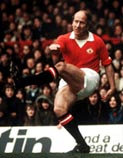
Sir Bobby Charlton CBE, was born in Ashington, Northumberland on October 11, 1937 and made his debut versus Charlton Athletic on October 6, 1956. He scored twice on his debut.
Charlton was one of the most skilful players of his era, perhaps some of the great talent of Newcastle centre-forward Jackie Milburn had passed from uncle to nephew. He practised for hours by himself, honing and refining his skill and it was his commitment to the game that awarded him schoolboy international honours. It was during that time that he caught the eye of Manchester United's youth squad and he became a member of the team that won the Youth Cup from 1954 to 1956.
As an inside-forward, he displayed exhilarating skills but after surviving the Munich Air disaster he moved to the centre-forward position where he represented both club and country. Yet Charlton was far from the conventional number nine and operated more as a midfield player, supplying measured sweeping passes from deep inside the pitch. He also continued to score on a regular basis and was explosive in front of goal.
In 1957 he won his first League Championship, but a year later could have been seriously injured or died as he was thrown 40 yards from the wreckage of the aircraft that crashed on take-off from Munich. Twenty three people died including eight United players.
Charlton recovered and made his debut for England versus Scotland and also played in the FA Cup Final in a defeat by Bolton. A regular selection for his country, he scored 49 goals and went on to win a record 106 England caps, but it was in 1966 that he realised his own and the club's potential. The World Cup provided the watershed of Bobby Charlton's career; not only did he lift the Cup over his head as England celebrated the ultimate glory, he scored two goals in the semi-finals versus Portugal, exceeded Tom Finney's record as most capped England player with 77 appearances, and was also voted Footballer of the year with European scribes selecting him for a similar award.

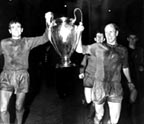
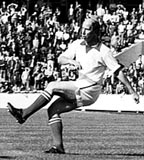
A year later he won the League Championship for a third time and two years later he won the European Cup Winners medal, captaining United to thier victory against Benfica. The fruits of his labour for England paid off well when he was awarded captaincy in 1969 versus Romania and was also awarded one of his highest honours - an OBE.
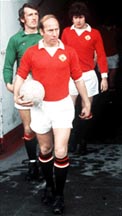
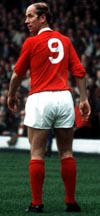
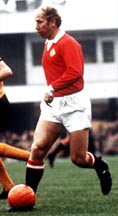
In 1973 Charlton retired as a United player after 604 league games and 198 league goals, a few months later he took the post of manager for Preston North End and also came out of retirement playing 38 games. Following was his CBE for services to football. His football career was far from over though. In 1981 he started a sports school to teach youngsters and in 1983 managed Wigan Athletic, but a year later he was back at Manchester as Director. He also received a gold medal from FIFA for services to football and in 1994 was knighted.
Charlton is a hero to the game of football and one of the greatest role models the game has ever produced.